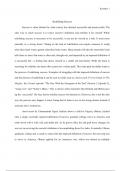Kershaw 1
Redefining Success
Success is often defined by what society has deemed successful and unsuccessful. The
only way to reach success is to reject society’s definition and redefine it for oneself. While
redefining success is necessary to be successful, it can not be viewed as a task. It must come
naturally as a strong desire. Taking on the task of redefinition can require someone to weigh
what their heart wants against what their brain wants. Many people will take the route their brain
tells them to since that route is often safe, thought-out, and impacted by an imposed definition of
a successful life—a feeling that draws oneself to a stable job and family. While the brain is
searching for stability, the heart often yearns for a riskier path. This risky path inevitably leads to
the process of redefining success. Examples of struggling with the imposed definition of success
and the process of redefining it can be seen in works such as; Americanah, Forrest Gump, In The
Heights, the Friends episode “The One With the Sonogram at the End” (Season 1, Episode 2),
“Long Live” and “Sonny’s Blues.” This is shown when characters like Ifemelu and Obinze give
up the ‘successful’ life they had to redefine success for themselves. However, this is not the only
way the process may happen. Forrest Gump had to learn to act on his strong desires instead of
someone else’s instruction.
Americanah by Chimamanda Ngozi Adichie shows a child in Nigeria, Obinze, latched
onto a single, societally imposed definition of success; graduate college, move to America, and
settle down with a wife, kid, and stable job. As he grows older, the end goal never changes; he
was set on receiving the societal validation of accomplishing these five tasks. Eventually, Obinze
graduates college and is ready to chase after the imposed definition of success: the next step was
to move to America. Obinze applied for an American visa, which was denied on multiple
, Kershaw 2
occasions. Desperate for societal validation, Obinze overstayed his work Visa in the United
Kingdom and attempted to meet society’s standard for success. However, once again, he did not
reach that definition of success. After being deported back to Nigeria, Obinze scrambled to make
do with anything he had. He moved on to finding a wife, having a kid, and living a lavish
lifestyle as a real estate agent. This time, he thought he was successful. However, after a few
years, Obinze realizes he is still unsuccessful. The narrator describes Obinze as feeling “bloated
from all he had acquired—the family, the houses, the cars, the bank accounts—and [he] would,
from time to time, be overcome by the urge to prick everything with a pin, to deflate it all, to be
free” (Adichie 27). For Obinze, redefining success was not a natural thought until he reached the
original end goal. After doing so and finding he was unhappy, he began redefining success for
himself. Ignoring the dismay of those around oneself is the hardest part of redefining success;
this is something that Obinze truly struggled with. After telling his wife, Kosi, that he wanted a
divorce, Kosi managed to convince him to stay. It was only after the second time, a few months
later, that Obinze finally put his foot down; they were getting a divorce, and he was, for the first
time, redefining success for himself.
Similar to Obinze, Ifemelu leaves Nigeria primarily because of external pressures. While
in America, she accomplishes some incredible things, and many would consider her a successful
woman. Despite being a college graduate, completing a Princeton fellowship, and running her
own blog, the narrator describes Ifemelu as feeling like “Nigeria became where she was
supposed to be, the only place she could sink her roots in without the constant urge to tug them
out and shake off the soil” (12). This feeling led Ifemelu to redefine success for herself. Despite
the opinion of the hair braider who judged her for leaving America after 13 years of hard work or
her parent’s worry that Ifemelu was starting her life over in her early 30s. Ifemelu decided it was




